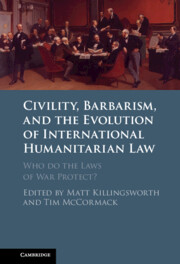 Civility, Barbarism and the Evolution of International Humanitarian Law
Civility, Barbarism and the Evolution of International Humanitarian Law The Montreux Document
Published online by Cambridge University Press: 11 January 2024
Despite its often poor reputation and the scaremongering that accompanied its growth, the private military and security industry does not threaten the content or spirit of international humanitarian law (IHL). Nonetheless, concerns remain about both the behaviour of actors within the industry – private military and security companies (PMSCs), their employees, and employers – as well as the interest and capacity of states to hold these actors to account. There is a tension, therefore, between the clear applicability of IHL to PMSCs and doubts about its enforcement. The private military and security industry illustrates the gap between the ideals of IHL and its operational reality, and how this gap has then informed the creation of new soft law frameworks. In recent decades, international efforts have sought to further establish such guidance for the behaviour and use of PMSCs. One such effort, the Montreux Document, is an initiative of the International Committee of the Red Cross (ICRC) and Swiss Government, restating existing standards. While the Document has seen success in terms of state engagement and participation, PMSCs and their employers, as well as the broader regulatory climate around PMSCs, appear largely unaffected.
To save this book to your Kindle, first ensure [email protected] is added to your Approved Personal Document E-mail List under your Personal Document Settings on the Manage Your Content and Devices page of your Amazon account. Then enter the ‘name’ part of your Kindle email address below. Find out more about saving to your Kindle.
Note you can select to save to either the @free.kindle.com or @kindle.com variations. ‘@free.kindle.com’ emails are free but can only be saved to your device when it is connected to wi-fi. ‘@kindle.com’ emails can be delivered even when you are not connected to wi-fi, but note that service fees apply.
Find out more about the Kindle Personal Document Service.
To save content items to your account, please confirm that you agree to abide by our usage policies. If this is the first time you use this feature, you will be asked to authorise Cambridge Core to connect with your account. Find out more about saving content to Dropbox.
To save content items to your account, please confirm that you agree to abide by our usage policies. If this is the first time you use this feature, you will be asked to authorise Cambridge Core to connect with your account. Find out more about saving content to Google Drive.